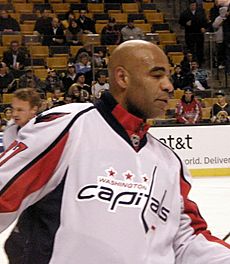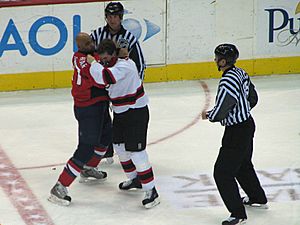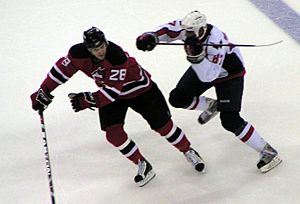Donald Brashear facts for kids
Quick facts for kids Donald Brashear |
|||
|---|---|---|---|

Brashear with the Washington Capitals during the 2008–09 season.
|
|||
| Born | January 7, 1972 Bedford, Indiana, U.S. |
||
| Height | 6 ft 3 in (191 cm) | ||
| Weight | 240 lb (109 kg; 17 st 2 lb) | ||
| Position | Left wing | ||
| Shot | Left | ||
| LNAH team Former teams |
Jonquiere Marquis Montreal Canadiens Vancouver Canucks Philadelphia Flyers Washington Capitals New York Rangers Modo Hockey |
||
| National team | |||
| NHL Draft | Undrafted | ||
| Playing career | 1992–2024 | ||
Donald Brashear (born January 7, 1972) is an American-Canadian former professional hockey player. He played for five teams in the National Hockey League (NHL) during a 16-year career. In the NHL, he was known for his role as an enforcer. An enforcer is a player who protects their teammates and helps keep the game fair by responding to overly aggressive play from opponents.
Brashear was often among the NHL leaders in penalty minutes for six seasons. Penalty minutes are given to players for breaking rules during a game. He finished his career 15th all-time in penalty minutes. He still holds the Vancouver Canucks' record for most penalty minutes in a single season, which he set in the 1997–98 season.
He was involved in a well-known on-ice incident during the 1999–2000 season. In this event, he was hit in the head by Marty McSorley's stick.
Contents
Early Life and Hockey Beginnings
Donald Brashear was born in Bedford, Indiana. As a child, he moved to Val-Bélair, Quebec, where his mother's family lived.
Brashear faced many challenges during his childhood. He eventually moved into a foster home in Val-Bélair when he was eight years old. There, he started playing hockey with his new siblings. To help pay for his hockey gear, Brashear sold baked goods and garbage bags door-to-door. He also worked as a paper boy. He played in the famous Quebec International Pee-Wee Hockey Tournament three times, in 1984, 1985, and 1986. He played with different minor ice hockey teams from Quebec City.
Professional Hockey Career
Starting in the NHL
The Montreal Canadiens signed Brashear as a free agent in 1992. He played for their minor league team, the Fredericton Canadiens in the American Hockey League (AHL), for parts of three seasons. He then became a regular player for Montreal in the NHL. During the 1993–94 AHL season, he had his best professional year with 38 goals and 66 points. He also had 250 penalty minutes in 62 games.
Brashear made his NHL debut on November 15, 1993, against the Ottawa Senators. He earned his first NHL point with an assist in that game. Two days later, he scored his first NHL goal against the Edmonton Oilers. After playing for the Canadiens for four seasons, he was traded to the Vancouver Canucks in 1996. This trade happened after a disagreement with his coach, Mario Tremblay. Brashear finished that season with 13 points and 245 penalty minutes, which was the seventh-highest in the NHL.
Time with the Vancouver Canucks
In the 1997–98 season, Brashear led the NHL in penalty minutes with 372. This also set a new record for the Canucks team. He also scored 18 points that season. During this year, he was suspended for four games for hitting Ian Laperrière. Brashear said he did it because Laperrière had hit his teammate, Gino Odjick, from behind.
The 1998–99 season was the only time in his career that he played in all 82 games. He again led the Canucks in penalty minutes and was eighth in the NHL. In the 1999–2000 season, Brashear scored a career-high 11 goals. However, this season is also remembered for a serious incident on the ice.
The McSorley Incident
On February 21, 2000, during a game against the Boston Bruins, Brashear was involved in a fight with Marty McSorley. Brashear won the fight. Later in the game, Brashear accidentally collided with Bruins goalie Byron Dafoe, who had to leave the game with a knee injury.
Near the end of the game, McSorley hit Brashear in the head with his stick from behind. Brashear fell to the ice and suffered a serious injury. McSorley was suspended from the NHL and faced legal charges for his actions.
Brashear recovered and returned to play before the season ended. McSorley's career in the NHL effectively ended after this incident.
Playing for the Flyers and Capitals
Brashear played in 79 games in the 2000–01 season, getting 19 assists and 28 points. In the 2001–02 season, he was traded to the Philadelphia Flyers. Between the two teams, he set a career-high with 32 points and had 199 penalty minutes.
In 2002–03, he earned the Pelle Lindbergh Memorial Trophy. This award is given to the Flyers' most improved player. During the 2003–04 season, he had 212 penalty minutes, ranking him fifth in the league. He was also involved in the most penalized game in NHL history on March 5, 2004. In this game, Brashear started a fight with Ottawa's Rob Ray, which led to many other fights breaking out.

Due to the NHL lockout that cancelled the 2004–05 NHL season, Brashear played in a semi-pro league called the Ligue Nord-Américaine de Hockey (LNAH). He scored 18 goals and 50 points in 47 games.
After the NHL lockout, Brashear signed with the Washington Capitals on July 14, 2006. He was brought in to help protect star player Alexander Ovechkin. Brashear was known for being a skilled player who also brought a strong presence to the team. He was suspended for one game in the 2006–07 season for punching New York Rangers player Aaron Ward. At the end of that season, his points increased to 13, and his 156 penalty minutes ranked him sixth in the league.
In the 2007–08 season, Brashear played in 80 games for the Capitals. He served as one of the team's alternate captains. In the 2008–09 season, his point total dropped to four. During the 2009 Stanley Cup playoffs, he received a suspension for two incidents against the New York Rangers.
Later Career and Retirement
Brashear wanted to stay with the Capitals, hoping to win a Stanley Cup. However, the Capitals did not re-sign him. He then signed a two-year contract with the New York Rangers. On November 12, 2009, he played in his 1,000th NHL game against the Atlanta Thrashers.
Brashear struggled with his role in New York and asked for a trade. He was eventually sent to the Rangers' AHL team, the Hartford Wolf Pack. He was happy to get more playing time there. In 2010, the Rangers traded Brashear to the Atlanta Thrashers, who then bought out his contract, making him a free agent. At the end of the 2009–10 season, Brashear ranked 15th all-time in NHL history for penalty minutes.
After not getting much interest from NHL teams, Brashear returned to the LNAH. He signed with Sorel-Tracy GCI and later played for Rivière-du-Loup 3L. In November 2014, Brashear came out of retirement to play for Modo Hockey in the Swedish Hockey League (SHL) for a short time. He scored one goal there.
Brashear returned to the LNAH for one more season in 2015–2016, playing only 7 games before retiring again. He came out of retirement once more in the 2023–2024 season to play for the Jonquière Marquis, even getting into a fight in his first game back.
International Play
Brashear played for the United States twice. He made his international debut at the 1997 World Championship. He scored two goals and five points in eight games, helping the U.S. finish in sixth place. He was surprised to be invited but felt it showed he could play more than just an enforcer role. He played for the U.S. again at the 1998 World Championship, where the team finished 12th.
Playing Style

Donald Brashear was known as an enforcer in hockey. His main job was to protect his teammates from rough or unfair play by opponents. He was a strong forechecker, meaning he would aggressively pressure opponents to get the puck back. He also delivered powerful body checks.
When fighting, Brashear used his balance and upper-body strength. He would take his time to control his opponents before landing punches. Even though he was naturally left-handed, he became good at using both hands during fights. Throughout his NHL career, Brashear was considered one of the toughest and most feared players in the league.
The Hockey News magazine named Brashear the "Enforcer of the Decade" in January 2010. They noted that he was so feared that he likely would have been in even more fights if opponents weren't so hesitant to challenge him. Hockey analyst Bill Clement said that Brashear was smart about when to fight, choosing moments when it could help his team gain momentum. The Hockey News also praised his intimidating presence and decent skating.
Mixed Martial Arts
In April 2011, Brashear signed a contract to compete in mixed martial arts (MMA). His first fight was on June 4, 2011, against Mathieu Bergeron in Quebec City. Brashear won the fight by TKO (Technical Knockout) in just 21 seconds. He quickly knocked Bergeron down and continued to hit him, leading the referee to stop the fight.
Personal Life
Donald Brashear has two sons, Jordan and Jaxxon. Jaxxon Brashear played football for the University of Ottawa Gee-Gees.
In 2007, Brashear and some friends started a house building company called DEC Construction. He works on construction sites during the off-season. He is good with languages, speaking French and English, and has also learned some Russian and Spanish. He enjoys music and plays the piano, and is learning to play the acoustic guitar.
Brashear's great-uncle, Carl Brashear, was a very important figure. He was the first African-American to become a certified Master Diver in the United States Navy. His life story inspired the movie Men of Honor.
In October 2019, it was reported that Brashear was working at a Tim Hortons restaurant in Quebec City. The restaurant was owned by former hockey player Pierre Sévigny.
Career Statistics
Regular season and playoffs
Bold indicates led league
| Regular season | Playoffs | |||||||||||||
|---|---|---|---|---|---|---|---|---|---|---|---|---|---|---|
| Season | Team | League | GP | G | A | Pts | PIM | GP | G | A | Pts | PIM | ||
| 1988–89 | Ste-Foy Gouverneurs | QAAA | 10 | 1 | 2 | 3 | 10 | — | — | — | — | — | ||
| 1989–90 | Longueuil Collège Français | QMJHL | 64 | 12 | 14 | 26 | 169 | 7 | 0 | 0 | 0 | 11 | ||
| 1990–91 | Longueuil Collège Français | QMJHL | 68 | 12 | 26 | 38 | 195 | 8 | 0 | 3 | 3 | 33 | ||
| 1991–92 | Verdun Collège Français | QMJHL | 65 | 18 | 24 | 42 | 283 | — | — | — | — | — | ||
| 1992–93 | Fredericton Canadiens | AHL | 76 | 11 | 3 | 14 | 261 | 5 | 0 | 0 | 0 | 8 | ||
| 1993–94 | Fredericton Canadiens | AHL | 62 | 38 | 28 | 66 | 250 | — | — | — | — | — | ||
| 1993–94 | Montreal Canadiens | NHL | 14 | 2 | 2 | 4 | 34 | 2 | 0 | 0 | 0 | 0 | ||
| 1994–95 | Fredericton Canadiens | AHL | 29 | 10 | 9 | 19 | 182 | 17 | 7 | 5 | 12 | 77 | ||
| 1994–95 | Montreal Canadiens | NHL | 20 | 1 | 1 | 2 | 63 | — | — | — | — | — | ||
| 1995–96 | Montreal Canadiens | NHL | 67 | 0 | 4 | 4 | 223 | 6 | 0 | 0 | 0 | 2 | ||
| 1996–97 | Montreal Canadiens | NHL | 10 | 0 | 0 | 0 | 38 | — | — | — | — | — | ||
| 1996–97 | Vancouver Canucks | NHL | 59 | 8 | 5 | 13 | 207 | — | — | — | — | — | ||
| 1997–98 | Vancouver Canucks | NHL | 77 | 9 | 9 | 18 | 372 | — | — | — | — | — | ||
| 1998–99 | Vancouver Canucks | NHL | 82 | 8 | 10 | 18 | 209 | — | — | — | — | — | ||
| 1999–2000 | Vancouver Canucks | NHL | 60 | 11 | 2 | 13 | 136 | — | — | — | — | — | ||
| 2000–01 | Vancouver Canucks | NHL | 79 | 9 | 19 | 28 | 145 | 4 | 0 | 0 | 0 | 0 | ||
| 2001–02 | Vancouver Canucks | NHL | 31 | 5 | 8 | 13 | 90 | — | — | — | — | — | ||
| 2001–02 | Philadelphia Flyers | NHL | 50 | 4 | 15 | 19 | 109 | 5 | 0 | 0 | 0 | 19 | ||
| 2002–03 | Philadelphia Flyers | NHL | 80 | 8 | 17 | 25 | 161 | 13 | 1 | 2 | 3 | 21 | ||
| 2003–04 | Philadelphia Flyers | NHL | 64 | 6 | 7 | 13 | 212 | 18 | 1 | 3 | 4 | 61 | ||
| 2004–05 | Quebec Radio X | LNAH | 47 | 18 | 32 | 50 | 260 | 8 | 4 | 6 | 10 | 42 | ||
| 2005–06 | Philadelphia Flyers | NHL | 76 | 4 | 5 | 9 | 166 | 1 | 0 | 0 | 0 | 0 | ||
| 2006–07 | Washington Capitals | NHL | 77 | 4 | 9 | 13 | 156 | — | — | — | — | — | ||
| 2007–08 | Washington Capitals | NHL | 80 | 5 | 3 | 8 | 119 | 7 | 1 | 1 | 2 | 0 | ||
| 2008–09 | Washington Capitals | NHL | 63 | 1 | 3 | 4 | 121 | 4 | 0 | 0 | 0 | 18 | ||
| 2009–10 | New York Rangers | NHL | 36 | 0 | 1 | 1 | 73 | — | — | — | — | — | ||
| 2009–10 | Hartford Wolf Pack | AHL | 27 | 2 | 4 | 6 | 25 | — | — | — | — | — | ||
| 2010–11 | Riviere-du-Loup 3L | LNAH | 28 | 17 | 14 | 31 | 66 | — | — | — | — | — | ||
| 2011–12 | Riviere-du-Loup 3L | LNAH | 18 | 3 | 5 | 8 | 63 | — | — | — | — | — | ||
| 2012–13 | Riviere-du-Loup 3L | LNAH | 1 | 0 | 2 | 2 | 12 | — | — | — | — | — | ||
| 2014–15 | Modo Hockey | SHL | 12 | 0 | 0 | 0 | 6 | |||||||
| 2015–16 | Thetford Assurancia | LNAH | 7 | 2 | 0 | 2 | 10 | — | — | — | — | — | ||
| 2023–24 | Jonquière Marquis | LNAH | 24 | 2 | 6 | 8 | 45 | — | — | — | — | — | ||
| NHL totals | 1,025 | 85 | 120 | 205 | 2,634 | 60 | 3 | 6 | 9 | 121 | ||||
International
| Year | Team | Event | Result | GP | G | A | Pts | PIM | |
|---|---|---|---|---|---|---|---|---|---|
| 1997 | United States | WC | 6th | 8 | 2 | 3 | 5 | 8 | |
| 1998 | United States | WC | 12th | 6 | 0 | 0 | 0 | 10 | |
| Senior totals | 14 | 2 | 3 | 5 | 18 | ||||
All statistics taken from NHL.com
Mixed martial arts record
| Res. | Record | Opponent | Method | Event | Date | Round | Time | Location | Notes |
|---|---|---|---|---|---|---|---|---|---|
| Win | 1–0 | TKO (punches) | Ringside MMA | June 4, 2011 | 1 | 0:21 | Quebec City, Quebec, Canada | MMA debut, first win |
See also
- Fighting in ice hockey
- Black players in ice hockey
- List of NHL players with 1,000 games played
- List of NHL players with 2,000 career penalty minutes
 | Anna J. Cooper |
 | Mary McLeod Bethune |
 | Lillie Mae Bradford |

